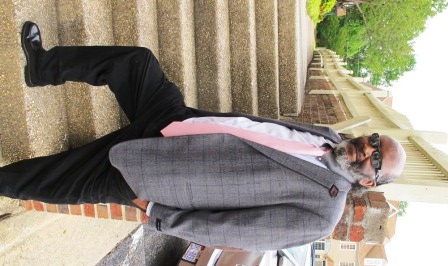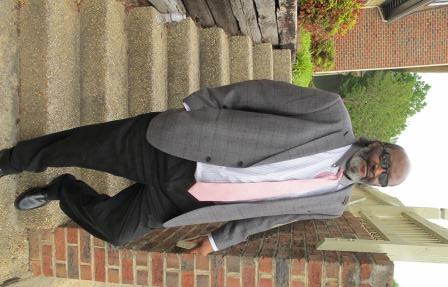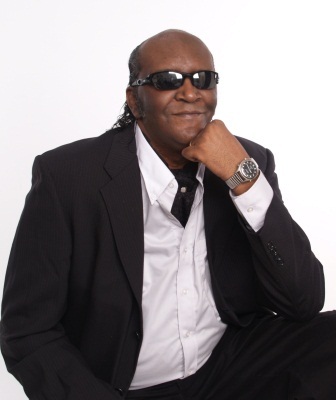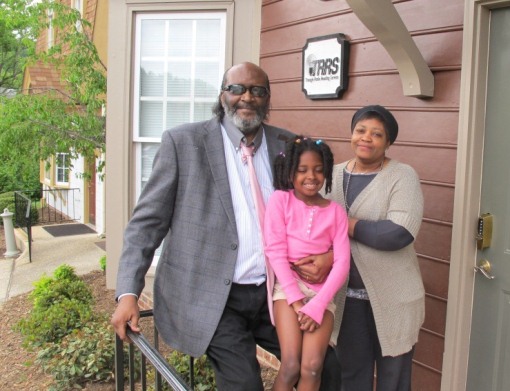 Looking for insight into just how valuable accessible audio textbooks can be for blind people who have academic and professional aspirations? Listen in on our conversation with Dr. Charles Walker -- scholar, college professor, counselor-educator, public speaker, entrepreneur, tireless advocate for people with disabilities, and long time Learning Ally member.
Looking for insight into just how valuable accessible audio textbooks can be for blind people who have academic and professional aspirations? Listen in on our conversation with Dr. Charles Walker -- scholar, college professor, counselor-educator, public speaker, entrepreneur, tireless advocate for people with disabilities, and long time Learning Ally member.
RALEIGH, NC -- Meeting Charles Walker for the first time, a visitor enjoys a mixture of first impressions. His physically towering stature is the first thing you notice, but his handshake is gentle; and his voice is soft and musical. Dark glasses accent an elegant and ageless demeanor belying his 51 years. As your conversation begins to flow, he’ll put you at ease, and soon enough you’ll discern that you’re in the presence of a blind man who is serene and at peace with his surroundings. There is an air of mystery and joyful purpose about him, and it may take a while to put your finger on where that is coming from.
Decades ago as an athlete and basketball player, Walker worked his way through a series of tryouts with a professional basketball team and got to the cusp of turning pro. But his eyesight was already beginning to fade in gradual stages, and his life changed course, taking him in unforeseen directions. When blindness finally caught up with him during early adulthood, Walker says, he “shut down” for a few years, going through the spectrum of darkness, pain and depression brought about by loss of independence.
Yet today, Walker transmits an unbridled sense of freedom; and on a daily basis he shares the elements of a purpose-driven life with his counseling clients and students. Clearly the main driver for him is an abiding faith in God and religious values he holds dear. He’s got a lovely, supportive wife and family around him too. And there are a whole lot of acronyms associated with his name now: He holds a
Ph.D. in Education from NC State; he is an
NCC (Nationally Certified Counselor), as well as a
DCC (Distance Credentialed Counselor). He’s developed the
WBID – the Walker Blind Identity Development model, the first of its kind in the world; and he also pioneered the Walker Attitudinal Barriers Questionnaire (
WABQ), a tool for self-assessment he uses to help people with disabilities reclaim their sense of worth and wholeness.
In their own way, these acronyms outline an inspirational story. After experiencing all dimensions of loss and adaptation that came with losing his eyesight, Walker shifted gears and went on a long journey into academia and education. Through constant hard work and determination, and with the help of resources like Learning Ally (back when it was known by its old acronym, RFB for Recording for the Blind), he became a creative independent thinker, an entrepreneur, counselor, teacher, public speaker, consultant, assistive technology trainer, and role model for countless young people. And today he is redefining what a blind person can do and be in society.
Recently, another acronym was added to his portfolio:
TRRS, which stands for
Triangle Radio Reading Service, a volunteer-driven organization that provides news and information to people who are visually and print impaired in a 20-county area of North Carolina and nationwide via the internet. Learning Ally has forged an alliance with TRRS, where Walker serves as a board member and radio show host. I met up with him at TRRS headquarters in Raleigh, to uncork several hours of dialogue that ran far too wide and deep to capture in one blog post, but here’s an extract.
– Doug Sprei
A lot of factors have played into your success. What did Learning Ally do for you?
The greatest thing it did was provide complete access to academic texts that I otherwise would not have had access to. The type of material Learning Ally has, the body of documents that are already prepared and read and described. . . it’s overwhelming. It’s awesome.
 What is it like without that access?
What is it like without that access?
When you go to class for the first time, you get your syllabus and find out what textbooks are required; and all throughout college and graduate school, you’re expected to have these readings. You go to the bookstore, or they are typically on hold in the library. And then if you’re blind, they expect you to play ‘Rumplestiltskin’ and turn straw into gold -- or convert print materials into accessible text. And you know. . . I’m no 'Rumplestiltskin.'
What do you mean?
I mean, for a blind person to have to convert print material, at a public university, into accessible text, so that the material can be read by screen readers and talking computers, is almost an insurmountable task. Unlike sighted students, this daunting chore requires people who are blind to scan multitudinous books and documents, requiring an investment of time that takes hours and hours. Believe me, most of your time is spent scanning and scanning, either in the library at school or at home on your own, and that’s a difficult proposition for a student. And the higher you go when you get to graduate school, the more difficult it becomes to manage the reading load. It’s so heavy that you almost don’t have time for all the preparation.
People who are blind can be a blessing to the rest of the world.I’ve spent literally six hours a day scanning stuff in the library, only to end up with files that are corrupt. This is a story that goes on throughout academia for people who are blind and print impaired. It’s a major issue, because one has to create his or her own accessible environment.
“Access to academic texts” – the words sound so cut and dry. What does it really mean for a blind person?
If you can’t read the text, it’s not possible to pass a test or a course. It affects everything, in terms of one's future academic and economic status. For example, everyone around you goes out to the grocery store to buy vegetables, they buy them freshly grown or in a can. But an individual who is blind is expected to plant, grow, harvest and prepare their own vegetables, as it were. In today’s fast paced society it’s essential to meet the challenge and keep up; as a disabled person it seems as if you’re in a different time zone. In other words, for a person who is blind or disabled to be required to create their own access, it creates a competitive disadvantage for them -- due to a lack of accessible infrastructure in the academic, employment and societal environments.
So Learning Ally helped to be more competitive, by having books already prepared and read – particularly math and statistics books, test and measurements books, quantitative kinds of things. Because the symbols and graphs in these books were described to me by people who are familiar with what the symbols actually mean.
 The human narration factor.
The human narration factor.
That’s a huge difference right there – because if you were to scan the book, those symbols come out like gobbledygook. And even if you schedule a regular person to come over and read it to you, he’ll say, “Well, there’s this x and y axis, and there’s this squiggly symbol here….” He will have no idea what it means, and these symbols all have meaning and are critical.
Conversely, the technical, quantitative and reference materials produced by Learning Ally are read by individuals with specific subject expertise and competencies. That element of expertise positions Learning Ally as an integral asset in the educational process, as well as in one's profession.
For example, major reference materials like the DSM – the Diagnostic and Statistical Manual of the American Psychological Association – can be 900 or a thousand pages in length. I won’t call it the Bible, but it’s really THE core book for diagnosis in our profession.
A group of trained volunteers were selected to narrate that book and render all of its symbols for you. What would you say to them?
I would say “Thank you very much!” To all of the volunteers with RFB&D and Learning Ally, you ARE an ally; you are a friend; and you are truly doing God’s will. This is a sacrifice and service to a population that absolutely needs this. Blind people, and all people with disabilities, are among those who make up “the least of these,” as the Bible says. So access is key – and not only access, but competent and ready access, as immediate as possible.
Maybe in those days it wasn’t as immediate as it is now.
Back when there were tapes, I waited for tapes to come; then it was CDs, so I waited for CDs to come; and now it’s digital files, which are virtually immediate. I listen to them on my Victor Reader Stream, which allows me total portability. I’m not restricted to one place, at school or at home. And bookmarking – that virtually becomes my note-taking. Since I’ve been blind, this is the first time I can immediately access a virtual audio library in the palm of my hand, and it’s wonderful. As a scholar, I need ready and immediate access to academic texts; and that’s one of the things Learning Ally does best.
Society does not easily accommodate people with disabilities. It seems like you’ve had to do a lot of work and advocating to get where you are today.
Yes. The constructed environment is primarily hostile and unwelcoming to people who are blind and disabled, due to a lack of infrastructure. Extraordinary efforts are required for those who are not privileged to function within readily accessible and inviting environments.
I went from GED to PhD. My story begins with God and one day will end with God. For me, I have been blessed with expectations of excellence and achieved exceptional success, because I walk by faith, and not by sight. Yes, I was my own self-advocate. . .although there were a lot of obstacles in the entire system designed to stop me and other blind people, God blessed me to achieve so that he would be glorified. My journey is like that of a lot of other blind people who have come down this road. All of my energy now is focused on helping others. I don’t do this for myself. I’m in the helping professions; I love my family, children and grandchildren, but this is what I was put here for.
A majority of the blind and visually impaired is underemployed; there are no job opportunities for them. What’s the state of that population as you see it?
Eighty to eighty-five percent of the blind and visually impaired are unemployed. For the totally blind, it goes up to 90 percent. That story hasn’t changed in a hundred years. . . or two thousand years, or six thousand years of recorded human history, because of negative attitudes toward the condition of blindness itself, and toward people who are blind. Even the Disciples who walked with Jesus Christ himself didn’t get it! It’s just something that’s been done since ancient days. But we are still
here.
Your outlook blends faith, academic clarity and a note of positivity.
We are still here, because God wants us to be here. Evil is in the world, but good is in the world too. I believe there are islands of access, and instruments of access -- like Learning Ally. And places like NC State and my department, who do accommodate people who are blind and disabled. God has given a way for us to survive and thrive.
Things are getting better. Steve Jobs built accessible technology right into the iPad and the iPhone; it talks, you don’t have to buy a $1,000 screen reader. That’s what we need – a universal design to where blindness is seen as a characteristic that is a part of the human condition; and the constructed environment builds in accessibility from the ground up. The idea is to have an infrastructure that supports all people, including those who happen to be blind.
We are all God’s children, and as soon as the world wakes up, whenever they get the scales off their eyes and see blind people and the disabled as members of the human family, the society, the economy. . .they’ll recognize the value and potential that we can bring to this earth and to this life. We were put here for a reason. I think people who are blind give people an opportunity to do God’s will. It is possible to see blindness as a blessing. People who are blind can also be a blessing to the rest of the world.

Above: Charles Walker with his wife Cheryl and granddaughter Noel, at the headquarters of Triangle Radio Reading Service in Raleigh, North Carolina
Editor's note: Readers are welcome to get in touch with Charles Walker via email. Visit Triangle Radio Reading Service at http://www.trianglereadingservice.org/